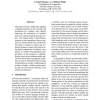Free Online Productivity Tools
i2Speak
i2Symbol
i2OCR
iTex2Img
iWeb2Print
iWeb2Shot
i2Type
iPdf2Split
iPdf2Merge
i2Bopomofo
i2Arabic
i2Style
i2Image
i2PDF
iLatex2Rtf
Sci2ools
ACL
2006
2006
Learning to Say It Well: Reranking Realizations by Predicted Synthesis Quality
This paper presents a method for adapting a language generator to the strengths and weaknesses of a synthetic voice, thereby improving the naturalness of synthetic speech in a spoken language dialogue system. The method trains a discriminative reranker to select paraphrases that are predicted to sound natural when synthesized. The ranker is trained on realizer and synthesizer features in supervised fashion, using human judgements of synthetic voice quality on a sample of the paraphrases representative of the generator's capability. Results from a cross-validation study indicate that discriminative paraphrase reranking can achieve substantial improvements in naturalness on average, ameliorating the problem of highly variable synthesis quality typically encountered with today's unit selection synthesizers.
| Added | 30 Oct 2010 |
| Updated | 30 Oct 2010 |
| Type | Conference |
| Year | 2006 |
| Where | ACL |
| Authors | Crystal Nakatsu, Michael White |
Comments (0)

